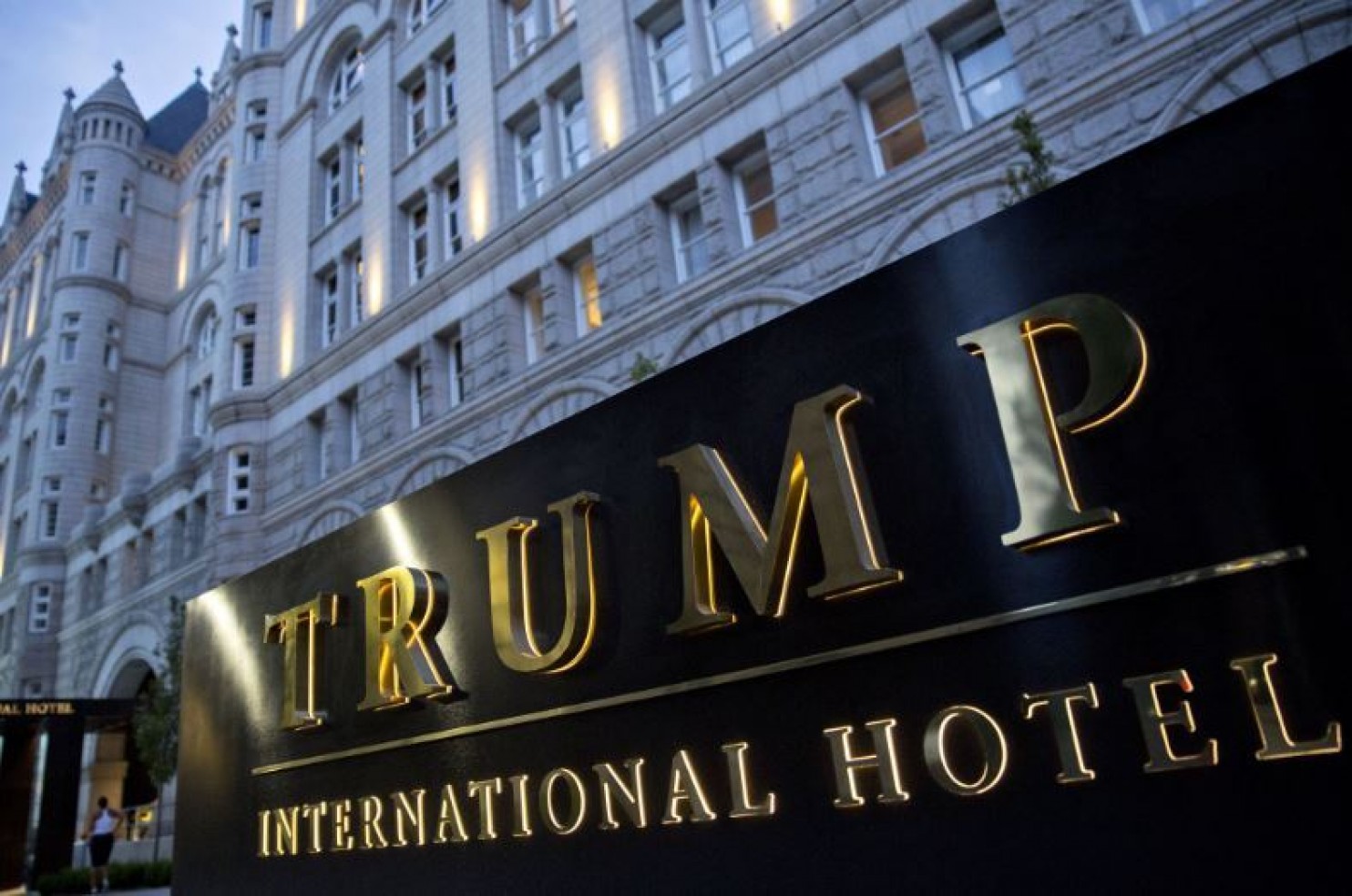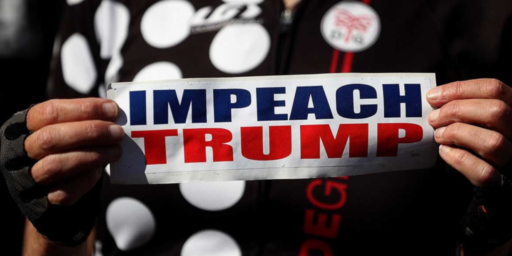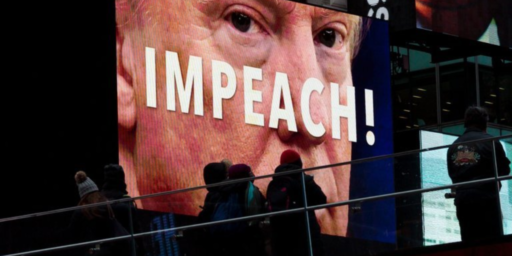Trump Company Made $2.5 Billion During Presidency
But compared to what?

Forbes senior editor Dan Alexander reports that “Trump’s Business Hauled In $2.4 Billion During Four Years He Served As President.” And that number would have been much higher but for the pandemic; the last year in office was by far the worst. The report breaks down the earnings in some detail. What it does not do, however, is tell us how much Trump’s businesses earned in the four years before he served as President or give us any comparative data relative to other businesses in the same sectors.
To be clear: we should not have to wonder whether Trump and his family profited from his time in office. As I was arguing before he even took the oath of office, both our ethical norms and the Emoluments Clauses of the Constitution would seem to have required that he divest himself of these assets. It’s an issue that I harped on time and again during his four years in office and, indeed, I argued that the grounds for removing him for office were stronger on these grounds than they were for the Ukraine strongarming that was the source of his first impeachment.
But it’s odd, indeed, to run a story in a major business publication on the company’s earnings without providing any useful context by which the readers can make judgments. Indeed, it’s quite possible that Trump so diminished his brand while in office that his company lost far more money than it gained by leveraging the not-unreasonable idea that those who want to get in the President’s good graces should stay at his hotels.




That is one shoddy article, not deserving of being in Forbes.
From what I read, it’s 2.5B in REVENUE, with zero accounting for expenses, depreciation, interest, and carryovers. Trump has always been cash poor, leveraged to the hilt. It could very well that he made 2.5 billion in revenue, but that possibly wasn’t even enough to cover this loans interest. Additionally, it’s been widely reported that his net work has taken a perilous dive, and that he’s been trying to unload the DC Hotel, with no luck, because it’s a money suck.
Without knowing expenses, the revenue number is just that. Gross receipts. Seems like a lot until you remember how much debt Trump is carrying, alot of is personally.
According to the BBC, and other sources such as Bloomberg, Trump lost money during his presidency:
http://www.bbc.com/news-business-56438914
The BBC attributes much of the loss to the pandemic. Even his golf clubs took a financial hit in this period, though golf became more popular during the pandemic because it’s played outdoors and is socially distanced.
Unless the numbers came from an independent audit of their financials, IMO they can’t be trusted. I’d take this with a grain of salt.
One of the biggest reasons we long ago parted ways with the TO, aside from the obvious one – he’s obnoxious to deal with – was the risk of the firm potentially being exposed to accomplice liability for fraud. Their books are a fantasy.
But as many people besides me have noted, that’s not really feasible. It’s not like selling off stock, or putting things into a blind trust. The Trump Organization is >500 interlocking LLCs. Trump is the sole member in some of them. In others, Trump’s contribution to the LLC is the use of his name. Many of the assets are illiquid. The estimates I have seen are that if Trump were to die today, it would take take the kids a decade to sort things out.
Add it to your list of ways the Constitution ought to be updated: assets have to be quickly divestable in order to be President.
@EddieInCA: Yeah. And even if it were all graft–which is highly possible, btw–this is “change in the sofa” level money in an economy the size of ours. It wouldn’t surprise me at all if being President turned out to be the final losing gambit for his “brand.” A guy who couldn’t make money running casinos and selling vodka certainly wouldn’t have made any being President.
These numbers are fictions. One of Trump’s companies was just caught red-handed running 2 sets of books. There was a story a few years about a 50 million loan between one Trump LLC and Trump himself that was oddly enough never paid back. And there was that golf club in Scotland which he bought in f—ing cash. It’s all just a lie.
@EddieInCA:
I don’t think the article is about how profitable the Trump Organization ultimately was, but rather about the fact that a sitting POTUS faced a financial exposure to the tune of $2.4bn.
More generally, can people with that kind of money on the line be trusted to look out for the public interest?
In this vein, it should also be noted that US Senators (I don’t really know about Representatives – there are so many) are shockingly rich compared to legislators in other western democracies.
It raises the question who these people serve: their voters or their wallets?
After all, it’s far, far easier to legislate to your own economic benefit if you own a big pile of money to start with, rather than having to depend on a reasonable salary.
Who supplied the numbers? Trump himself? I doubt this in the same way I doubt he was ever an actual billionaire.
And frankly I don’t really care how much he made.
I care that he killed >400,000 Americans (depending on the study you read).
I care that he tired to overthrow the Government and seems to be getting away with it.
I care that Republicans refuse to do anything about this fat orange cancer on democracy.
@Michael Cain: That would be an asburd requirement. Hard to define, impossible to clearly implement. Other than being time consuming (in terms of mechanically updating agreements), I can see no reason why putting LLCs into a Trust would be unfeasible.
Let’s try something simple for a change:
Any business owned by the president that’s not divested or placed in a blind trust, will have to pay a 105% tax on all its gross income (before expenses, depreciation, etc.), regardless of the existence of partners or stockholders.
What you earn is not what you keep.
@Michael Reynolds:
I don’t believe he even earned that much.
@drj:
Of course, people with lots of money on the line can’t be trusted. Trump’s precedents are the scale and the obviousness. That Trump would be self-serving was baked in from the beginning, yet these stories keep being run as though as some point the people will be shocked, shocked that there was grifting going on in Trump administration.
Trump’s enemies knew he was corrupt all along, his friends hope some of his ill-gotten gains would come their way, and his worshipers admire him for gaming the system because they hate the system.
The issue isn’t whether Trump made or lost money. He may have lost money, but did he lose as much as he would have otherwise? The issue is whether he directed money to his own companies’ benefit, and the answer is clearly yes, if by no other means than his trips to Mar-a-Lago (as opposed to, say, Camp David) with an entire secret service entourage at rack rate.
Is this penny ante stuff? Yes, but it’s always struck me how low rent Trump’s gifts have been, even before he won.
@drj:
This is a question to you? Really? (I’m assuming not, btw.)
But in terms of how many Congress critters are mind-numbingly (at least to my mind–but not a high bar to jump) wealthy, I reminded of something that an econ professor told the students in a class I took a few years back.
It’s a very incomplete story that deserves no coverage. Not sure what is gained by referencing it. In fact I should not even be posting this.
@Lounsbury: Assume a (not uncommon) membership obligation that Donald Trump stay at the facility at least one weekend per quarter, and participate in a meet-and-greet with the guests on that Saturday evening. Penalty for non-compliance is a multi-million dollar cash penalty. Withdrawal from membership is a much bigger cash penalty. How does the blind trust handle it?
@Michael Cain: What on earth does this have to do with LLCs and the structure of the Trump organization?
As for what appears to be a reference to … club memberships?[*] … well what you have cited has f-all to do with equity ownership and is some kind of personal obligation which rather evidently was not applied to him as a President, so utterly irrelevant (and irrelevant to a question of a Trust as such in terms of equity ownership).
A requirement for a President to have a certain kind of asset holding is what you asserted and is irrelevant to the cited, and in any case pointless and difficult to implement.
[*: I suppose you are confusing the US term for LLC equity interests, membership interests, with the concept of club memberships or the like]
@Kathy: Neither simple nor intelligent as a proposition but silly flailing for a ‘solution’
@Lounsbury: No, LLC membership — so called because from the IRS perspective for tax purposes, they are partnerships. You’re a member of a partnership, subject to whatever conditions have been imposed. Ditto for an LLC, in most states. They. Are. Not. Corporations. The terms of what each member provides to the partnership/LLC, and conditions they must meet, are whatever the “members” sign off on. So, one member of an LLC may provide $100M toward the purchase and debt service of a property. Another may license their name and agree to personal appearances. This is not unusual, particularly in real-estate deals.
Now start trying to take such an arrangement apart. Six partnerships, say, with each member subject to certain kinds of obligations. Each partnership owns a piece of a seventh partnership, which owns a $500M resort hotel. If the resort hotel declares bankruptcy, which individuals are responsible for how much money? Years in court to sort it out. In the meantime, in the worst case, dozens of people legitimately (or not, but dependent on exact timing) claim capital gains and loses for taxes and dates them backwards or forwards.
There’s a reason that real estate people, from large to small, use LLCs and not conventional corporations.
@Michael Cain: yes, LLC membership. I am quite aware of the law here mate, we use US LLCs quite extensively in venture and hedge fund structures.
So no, you are not in an LLC member of a partnership. An LLC is not a partnership. It is a company. It is under US federal taxation either a pass-through taxed as partnership (or sole proprietor if a single member) or it may opt for corporate taxation (as in fact in some of my structures we have both Series LLC as pass-throughs holding single member LLC as Corporation as a tax blocker). This is a US federal income taxation issue quite separate from the legal obligations (and often state taxation form, and completely separate from employer taxation status).
Whatever possible potential personal engagements of Trump as a Natural Person might have under some queer LLC Operating Agreement, the personal duty or engagement is entirely and utterly separable from the equity ownership and it is merely a contracting. And utterly independent from ownership issue versus personal engagement as President.
The complexity otherwise evoked is merely structuring detail which is labour to change but not particularly an issue of LLC contra corporation.
The reason US real estate uses LLCs is the pass-through status with company form, advantageous over both proper partnership in legal terms in having the company form over partnership [and thus limitation of liability flow through unlike partnership(*)] and in US federal taxation terms, advantageous in company income tax terms. The same reason one uses it in certain hedge fund structures. And thus endeth your lesson, hopefully ending your confusion of partnerships and LLCs.
(*: of course financial institutions may and do ask for personal guarantees, but this is in parallel to the LLC – and really no different from corporation situation where one asks the entrepreneur for personal guaranty even though the company form limits liability arising via the company itself)
It’s quite plausible that Trump anticipated his time in the White House would make him even wealthier, assuming he was wealthy to start with. His tenuous engagement with reality probably meant he expected to be universally loved and admired, meaning everyone would flock to buy his condos and patronise his resorts, and the value of his brand would go through the roof. The possibility that the majority of Americans would despise him, and the rest of the world regard him as a dangerously incompetent buffoon, no doubt never crossed his mind.
Of course he should have placed his businesses in the hands of an independent trustee as soon as he was elected, with instructions that his assets were to be liquidated as quickly as possible. His sons should have been removed from their executive positions. The conflicts of interest he faced every day were beyond measure. To take just one example, his businesses carry hundreds of millions of dollars of debt, with interest rates tied in many cases to the US prime rate. But that didn’t stop him frequently trying to pressure the Fed into reducing interest rates. As James said, his behavior demanded impeachment but for whatever reason, neither Democrats nor the media made much of an issue of it. Perhaps they decided business matters are too arcane for average Americans.